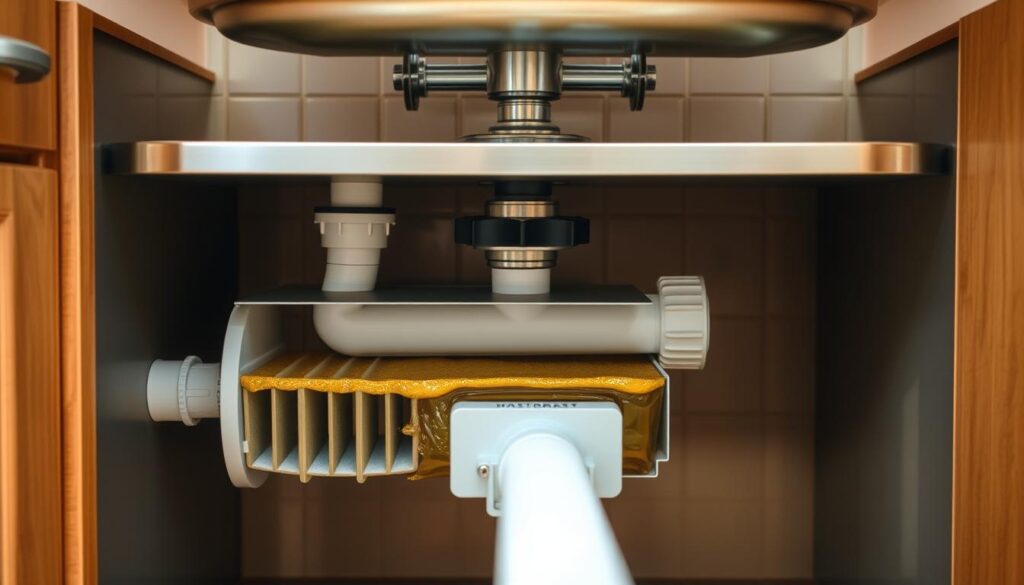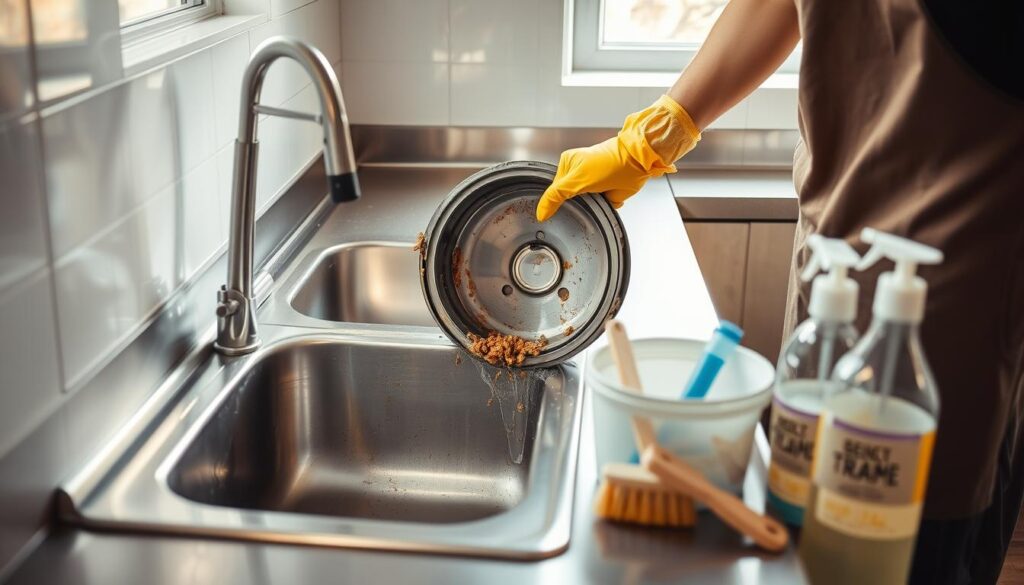Need a quick fix or advice to stop fat and oil from blocking your sink? We’re OnCall Emergency Plumbers and we help Melbourne homes keep water flowing and pipes clear. A compact grease interceptor with internal baffles slows hot wastewater so fats and oils rise while solids settle, letting cooler water exit to the sewer.
Simple habits make a big difference. Scrape food scraps and collect cooking oil before washing up to reduce the load entering the system. Regular pump-outs by a licensed contractor keep the unit performing and prevent blockages.
Correct design and flow matter too. The right baffles and gravity drainage ensure the unit works without odour or slow drains, and lowers maintenance risks compared with pumped layouts. If you need help with installation, compliance or urgent service, call us on 1800 571 216 or visit our emergency plumber Rockbank page for prompt support.
Key Takeaways
- Install a certified interceptor to separate fats and solids before they reach the sewer.
- Scrape and store oils to reduce how often you need pump-outs.
- Correct design and gravity flow improve efficiency and reduce odours.
- Licensed installation and regular servicing protect your property and the environment.
- We’re available 24/7 in Melbourne for advice, installs and urgent fixes.
Grease traps for Aussie homes: how they work and why prevention matters today
Stopping blockages starts with understanding how your kitchen wastewater behaves.
We explain how a domestic grease interceptor works: hot kitchen water slows in a baffled tank so fats and oils float and food solids sink. The outlet only passes cleaner water, improving system performance and efficiency over time.
What causes blockages in sinks and pipes
Blockages form when emulsified oil cools and re-solidifies, or when food sticks to pipe walls and combines with waste. Hot oil speeds deposits and long runs from the kitchen increase the risk.
Gravity drainage vs pumped systems
Gravity-first design gives the best flow and lowest failure rate. Where site grades prevent gravity, we recommend routing through the interceptor to a downstream pump well. Pumping into the unit is least preferred.
Materials, seals and environmental protection
Stainless-steel tanks, tight lids with gaskets and secure outlets reduce odour and leaks. Correct installation, size and access clearances keep maintenance safe and help protect the local environment by reducing polluted wastewater.
- We install, repair and maintain units to Australian standards and issue a Certificate of Compliance.
- For urgent help call 1800 571 216 or check our blocked drains Dingley Village services.
grease trap residential
A well-sized interceptor keeps kitchen drains flowing and avoids costly blockages.
We offer Melbourne-ready packages that focus on easy install, compliant design and fast turnarounds. Our team assesses inlet and outlet positions, projected water use and household habits to recommend the right size. This planning ensures the unit handles peak flow and gives room for future changes.

Our Melbourne-ready solutions: easy install, compliant design and fast turnarounds
We supply certified units and fit them to Australian standards. Licensed plumbers handle the installation, pressure and water testing, and issue a Certificate of Compliance.
Choosing the right size for your kitchen: inlet, outlet and flow considerations
Correct sizing matches maximum hourly flow and typical usage. We check inlet and outlet heights so gravity drainage works where possible. If gravity is impractical, we design a downstream interceptor pump arrangement that maintains efficiency.
Quality and durability: brand partnerships, stainless-steel and robust construction
We specify stainless-steel tanks, secure lids, threaded outlets and rubber seals to limit odour and ease cleaning. Partnering with reputable brands means quality components and reliable performance over time.
What’s included: installation, testing and certificate of compliance by licensed pros
- Assessment, supply and easy install by our licensed plumbers.
- Pressure and water testing, plus final commissioning.
- Certificate of Compliance and 24/7 support for urgent repairs or advice.
| Feature | Benefit | Typical Result |
|---|---|---|
| Correct size & inlet/outlet layout | Improved flow and lower maintenance | Fewer blockages and smoother operation |
| Stainless-steel tank & sealed lid | Durability and odour control | Longer life, easier cleaning |
| Licensed installation & testing | Compliance and safety | Certificate of Compliance on completion |
| 24/7 support and fast response | Emergency repairs when needed | Minimal disruption to home and environment |
Call us on 1800 571 216 for fast supply and installation across Melbourne.
Maintenance and cleaning to ensure smooth, reliable performance
Regular care preserves function and keeps your kitchen environment safe.
When to service: Book a check if you notice slow sink drainage, odours from the lid or outlet, or visible build-up around pipes. These signs mean the unit is losing efficiency and needs attention.

Cleaning cadence and what a service includes
Certified contractors perform a full pump-out, scrape baffles and wash internal surfaces. They also inspect seals and fasteners to keep the system leak-free.
Safe access, lids and pump-out planning
Allow space above the tank at least equal to its depth for safe opening. On tight sites consider fixed pump-out lines for vacuum tanker access at street level.
Good kitchen habits that help
Collect oils, scrape food into the bin and avoid flushing solids. These small actions extend time between services and protect the pipes and environment.
| Task | Typical Frequency | Benefit |
|---|---|---|
| Full pump-out & baffle scraping | Weeks to months (site dependent) | Restores flow and prevents blockages |
| Seal & lid inspection | Every service | Reduces odour and speeds future cleaning |
| Access check & fixed line planning | At installation / as needed | Safer, faster pump-outs |
We provide ongoing maintenance, emergency pump-outs and repairs across Melbourne 24/7. For tailored advice or to book our ongoing maintenance services, call 1800 571 216.
Conclusion
A well-made interceptor and simple care keep your kitchen plumbing working reliably.
Correct design and solid construction that favour gravity flow, safe access and tight seals give better capture and easier servicing. A properly sized grease trap protects pipes and reduces unplanned call-outs.
Regular pump-outs and internal cleaning keep water moving and prevent waste build-up that interrupts routines. Choosing licensed installation and compliant work lowers ownership costs over the life of the system.
For Melbourne homes and shops, we’re available 24/7 for installs, servicing and emergency repairs. Call OnCall Emergency Plumbers on 1800 571 216 to book a fast assessment.
FAQ
What is the basic purpose of a grease trap in a home kitchen?
We install a small interceptor to slow wastewater flow so fats, oils and food solids separate from water. This prevents blockages in household pipes and reduces odour in the kitchen while protecting the municipal sewer system.
How does a domestic grease interceptor actually separate fats, oils and grease?
The unit reduces flow speed so heavier solids sink and lighter oils rise. A baffle and internal chambers hold these materials while clearer water exits through the outlet, helping maintain smooth drainage and protecting downstream pipes.
What commonly causes blockages in sinks and pipes at home?
Blockages usually come from food scraps, cooled oil, and the way hot oil behaves as it cools and solidifies. Regular disposal habits and effective interceptors reduce the chance of costly clogs and slow drainage.
Which drainage design is best for efficient kitchen flow: gravity or pumped?
Gravity drainage is preferred where the layout allows; it’s simple and reliable. Pumped systems suit lower-level fixtures or complex layouts, but they need more maintenance and power. We recommend gravity-first where feasible.
What materials and lid types should we look for when choosing a tank and seal?
Durable materials like stainless steel or reinforced plastic resist corrosion. A tight-sealing lid with a secure gasket controls odour and prevents spills. Choose a model that offers easy access for servicing and a robust outlet connection.
How does a kitchen interceptor help protect the environment and plumbing compliance?
By trapping oils and solids, the unit keeps wastewater within local council guidelines and reduces contaminants entering treatment plants. Proper installation and regular servicing help us meet compliance and protect waterways.
What solutions do you offer in Melbourne for easy install and compliance?
We supply compliant, easy-to-install units with fast turnarounds and licensed installation. Our service includes site assessment, correct sizing, and a certificate of compliance upon completion.
How do we choose the right size for our kitchen unit?
Size depends on inlet flow, number of sinks and typical cooking volume. We assess flow rates, inlet and outlet positions and space constraints to recommend an appropriately rated unit that avoids frequent blockages.
What should we expect regarding quality and durability of units and brands?
Leading brands use stainless steel or heavy-duty polymers and tested baffles. We partner with reputable manufacturers to ensure long service life, corrosion resistance and parts availability for repairs.
What is included with a professional installation service?
A full service usually covers supply, site preparation, installation, pipe connections, initial testing and a compliance certificate from a licensed tradesperson. We also advise on access space and future maintenance.
When should we schedule servicing for reliable performance?
Service when you notice slow drainage, persistent odours or visible solids accumulating. Many households benefit from scheduled pump-outs every 3–12 months depending on use; we tailor advice to your kitchen habits.
What does regular cleaning involve?
Cleaning includes scheduled pump-outs, scraping baffles, removing accumulated solids and checking internal surfaces. Proper cleaning prevents foul smells and maintains outlet efficiency.
How important is safe access and lid planning for maintenance?
Very important. Leave adequate headroom above the unit and fit lids that allow secure, frequent access. Consider fixed pump-out lines if the tank sits in a difficult location to reduce service disruption.
What kitchen habits help prevent blockages and extend system life?
Collect used cooking oil in a sealed container for recycling, scrape plates into general waste, avoid pouring hot oil down the sink and use strainers to catch solids. Small daily habits greatly reduce maintenance needs.
